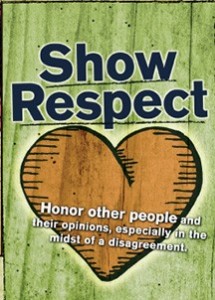In Search of Civility
- Share
- Tweet
- Pin
- Share

I’ve been battling with maintaining my weight for years and now I am finally in a program that works well. My in-laws recently invited my spouse and me over for a home-cooked meal. We sat down and the food was served up. Before I could take a bite, my father-in-law looked over at me and my plate and said, “I thought you were on a diet – not going to get there eating like that.” I didn’t say anything but many words have been flying around in my head ever since. I’ve been trying to think of a lighthearted comment that would give him the message without ticking him off.
I give you credit on a number of counts: you want to stand up for yourself; you want to be lighthearted; you don’t want to tick off your father-in-law. A lot of people would not be so generous when confronted with such a rude and uncivil comment. But your maturity comes through because you realize that being uncivil or mean-spirited yourself would only perpetuate and complicate the issue. You are choosing civility, even in the face of disrespect.
I have a couple of suggestions, but please proceed as you see fit. Obviously, you know yourself and your father-in-law, whereas I do not. It is fine that you said nothing in the moment, but do find a time to say something before the next family dinner; in private, not in the heat of battle, and yes, in a serious tone. Once you have made yourself clear, regardless of your father-in-law’s reaction, you can lighten up (especially around the family dinner table). Know your goals; what do you want to achieve? Do you want him to know that you were hurt and humiliated? Do you want him to stop any further condescending comments? Do you want to have a plan of action, in case a similar situation arises? Do you want to be comfortable the next time you sit down to dinner with him?
Use the non-threatening approach of the “I” statement (I feel [how you feel] when you [his behavior]). This way, you take full responsibility for yourself and how you reacted to his comment to you. You are not blaming him for how you reacted. Example: “Thanks for meeting with me. I’m having trouble getting over the incident at the dinner table a couple of weeks ago. (Remind him of the incident. He may have completely forgotten about it!) Please hear me out. I felt really hurt and humiliated when you made the comment about my being on a diet and the food on my plate. I need you to know that editorial comments do not help. Please don’t make them anymore, well, just the positive ones! I care about our relationship and want to clear the air. OK? Are we agreed? I want to be comfortable whenever we eat together as a family. In fact, may I throw you a dirty look or kick you under the table if it ever happens again?”
One last thing: It is a common defense for people to minimize (“I didn’t mean anything by it.”) and manipulate (“I was only joking. Can’t you take a joke?”). Learn to recognize and call out manipulation. You’ll know it when your feelings are in stark contrast to the other person’s supposed intent, or when you start to feel that the other person’s (bad) behavior is somehow your fault.
Thanks for sharing your story. Civility does begin at home. Good luck.

